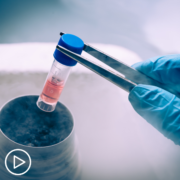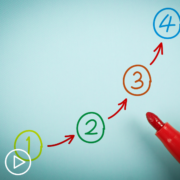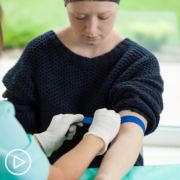How Can AML Patients Benefit From Shared Decision-Making?
How Can AML Patients Benefit From Shared Decision-Making? from Patient Empowerment Network on Vimeo.
How can shared decision-making benefit AML patient care? Expert Dr. Sara Taveras Alam from UTHealth Houston explains how she works to set patient expectations from diagnosis and throughout the treatment journey and patient factors that play into decision-making.
[ACT]IVATION Tip
“…patients know that they are the decision makers. The doctors are there to guide the patients to inform the patient. Definitely, there will be treatments that would not be recommended for a physician and they would not give, but generally, there’s more than one possible right answer, and the patient should be empowered to decide what fits best for their lifestyle and what accommodations need to be made.”
Related Resources:

|

Advancing Equity | Research Initiatives in AML Disparities Among Black and Latinx Populations |

How Do AML Patients and Outcomes Differ by Population Groups? |
Transcript:
Lisa Hatfield:
Dr. Taveras, how do you involve your patients and families in the shared decision-making process, both at initial diagnosis and then going forward?
Dr. Sara Taveras Alam:
From the initial diagnosis, I do try my best to explain what the life of an AML patient looks like. This can be very overwhelming and we tend to need to repeat ourselves throughout the patient-doctor relationship, most of our patients unfortunately, require a one-month-long admission initially at diagnosis, most of our patients receive diagnosis and remain in the hospital while they get their first treatment and recover from that. And that’s a very big journey to go through, and we want to make sure that the patients themselves are well-informed and their family and caregivers are well-informed of what this will mean for them as well.
Many of my patients may have children or parents or spouses that they themselves are the caregivers for and then they need to make arrangements for that while they’re going through their health process. So I believe that the decision to receive treatment is not a decision that doctors make for the patients. It’s a decision that should be made by the patient, and although most people will choose to receive treatment offers for acute myeloid leukemia, I will have some patients that may have been older and may have gone through other health issues and do not want to spend the rest of their lives in this process and that is their choice to make.
So I really do try from the very beginning to make sure I set an expectation of what life will look like with acute myeloid leukemia, and what that looks like initially is about a one month long hospitalization with chemotherapy, a lot of transfusions, monitoring for infections, and after that time period, it will have a lot of clinic visits, sometimes twice a week, and possibly re-hospitalizations for treatment depending on the treatment decided upon. We have more intensive chemotherapies or aggressive chemotherapies and lower intensity chemotherapies, that’s also a shared decision.
There may be patients who are appropriate for intensive chemotherapy in terms of their fitness or age, but may be afraid of the side effects that that could entail, and it may be appropriate for them to go with a low intensity, and that’s an option for them. So I think that ultimately, my activation tip for the question is that patients know that they are the decision makers. The doctors are there to guide the patients to inform the patient. Definitely, there will be treatments that would not be recommended for a physician and they would not give, but generally, there’s more than one possible right answer, and the patient should be empowered to decide what fits best for their lifestyle and what accommodations need to be made.
One example is, we’ve had a patient whose daughter had a sweet 16 and her re-admission was scheduled during that time, but it was really important for that patient to be with her daughter on her birthday, and we just pushed on the admission. If the patients bring up what their concerns are, we’ll do our best to accommodate as long as it’s not a risk to them.
Lisa Hatfield:
Great, thank you. And for all the patients listening, it’s nice to know that we can ask our providers if we have a special event, can this be changed, is there any chance of altering the timeline just a little bit. So thanks for that tip. We appreciate that.
Dr. Sara Taveras Alam:
You’re welcome.









